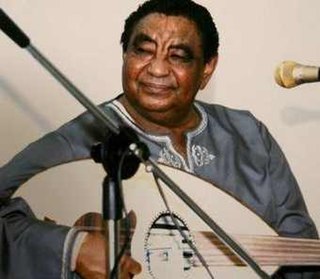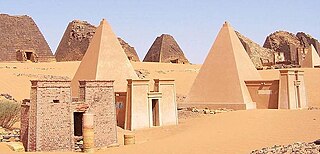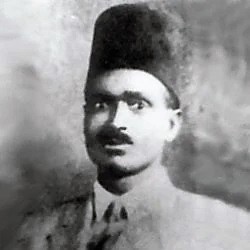Related Research Articles

Khartoum or Khartum is the capital city of Sudan. With a population of 6,344,348, Khartoum's metropolitan area is the largest in Sudan.

Omdurman is a major city in Sudan. It is the second most populous city in the country, located in the State of Khartoum. Omdurman lies on the west bank of the River Nile, opposite and northwest of the capital city of Khartoum. It is on the Nile river and acts as an important road hub, with the Nile boosting transportation even further.

The rich and varied music of Sudan has traditional, rural, northeastern African roots and also shows Arabic, Western or other African influences, especially on the popular urban music from the early 20th century onwards. Since the establishment of big cities like Khartoum as melting pots for people of diverse backgrounds, their cultural heritage and tastes have shaped numerous forms of modern popular music. In the globalized world of today, the creation and consumption of music through satellite TV or on the Internet is a driving force for cultural change in Sudan, popular with local audiences as well as with Sudanese living abroad.

El-Obeid, also romanized as Al-Ubayyid, is the capital of the state of North Kurdufan, in Sudan.

Wad Madani, Wad Medani or Madani is the capital of the Al Jazirah state in east-central Sudan. Wad Madani lies on the west bank of the Blue Nile, nearly 85 miles (136 km) southeast of Khartoum. It is linked by rail to Khartoum and is the center of a cotton-growing region. The city is also the center of local trade in wheat, peanuts, barley, and livestock. It is also headquarters of the Irrigation Service. In 2008, its population was 345,290. It is the home of the Al Jazirah University, the second biggest public university in Sudan. It also has Wad Medani Ahlia University, a private university.
Sudanese literature consists of both oral as well as written works of fiction and nonfiction that were created during the cultural history of today's Republic of the Sudan. This includes the territory of what was once Anglo-Egyptian Sudan, the independent country's history since 1956 as well as its changing geographical scope in the 21st century.

Mohammed Osman Hassan Salih Wardi, also known as Mohammed Wardi, was a Nubian Sudanese singer, poet and songwriter. Looking back at his life and artistic career, Sudanese writer and critic Lemya Shammat called him an "inspirational figure in Sudanese music and culture, whose prolific talent and massive contribution remains unsurpassed in Sudan."

The Central Bank of Sudan was the central bank of Sudan. The bank was formed in 1960, four years after Sudan's independence. It was located in the capital Khartoum. In April 2023, the Central Bank of Sudan was hit, and destroyed.
Khojali Osman of Al- Halfaya, Khartoum North, was a popular Sudanese musician, who was known throughout the country for his soothing voice and romantic music. He was known for singing songs such as ma bnikhtalif, habba, habba, asma3na marra and hajri w fatishi. The period from 1975 to 1994 witnessed the growth of his fame at great speed. In 1994, his life was cut short by a mysterious murder outside the Musicians' club in Omdurman.

Fatima Ahmed Ibrahim, was a Sudanese writer, women's rights activist and socialist leader.

The 2011–2013 protests in Sudan began in January 2011 as part of the Arab Spring regional protest movement. Unlike in other Arab countries, popular uprisings in Sudan had succeeded in toppling the government prior to the Arab Spring in 1964 and 1985. Demonstrations in Sudan however were less common throughout the summer of 2011, during which South Sudan seceded from Sudan, but resumed in force later that year and again in June 2012, shortly after the government passed its much criticized austerity plan.

Mahjoub Sharif, born as Mahjoub Muhammad Sharif Muhammad, was a Sudanese poet, teacher and activist for human rights. He became known in Sudan and other Arabic-speaking countries for his colloquial poetry and his public engagement, both committed to further the causes of democracy, freedom, general well-being and national identity. His poetry was put to music by eminent musicians, such as Mohammed Wardi and Mohamed Mounir, but also led to repeated political imprisonment under different Sudanese governments.
Suad Ibrahim Ahmed was a leader and central committee member of the Sudanese Communist Party. She was an activist for women's issues. She was a leader in the struggle against displacement of Nubian people of the Wadi Halfa region caused by erection of the Aswan Dam.
Cinema of Sudan refers to both the history and present of the making or screening of films in cinemas or film festivals, as well as to the persons involved in this form of audiovisual culture of the Sudan and its history from the late nineteenth century onwards. It began with cinematography during the British colonial presence in 1897 and developed along with advances in film technology during the twentieth century.

The visual arts of Sudan encompass the historical and contemporary production of objects made by the inhabitants of today's Republic of the Sudan and specific to their respective cultures. This encompasses objects from cultural traditions of the region in North-East Africa historically referred to as the Sudan, including the southern regions that became independent as South Sudan in 2011.

The architecture of Sudan mirrors the geographical, ethnic and cultural diversity of the country and its historical periods. The lifestyles and material culture expressed in human settlements, their architecture and economic activities have been shaped by different regional and environmental conditions. In its long documented history, Sudan has been a land of changing and diverse forms of human civilization with important influences from foreign cultures.

Khalil Farah was a Sudanese singer, composer and poet, who wrote his lyrics both in Sudanese colloquial as well as in Modern Standard Arabic. He is considered as one of the most prominent pioneers of the early 20th century renewal in singing and poetry in Sudan.
Hanan Bulu Bulu, is a modern Sudanese singer-songwriter and recording artist. In her music, she combines both songs by older Sudanese musicians as well as her own compositions. Her songs are characterized by modern arrangements ٫ played by her own band of professional musicians, and she enjoys wide popularity in Sudan as well as abroad.
Kamal Ibrahim Suleiman, better known as Kamal Tarbas, is a Sudanese singer-songwriter. He has contributed to the development of popular music in Sudan in the 1970s by his personal, down-to-earth way of singing, backed by orchestras with western musical instruments.
References
- 1 2 El Gizouli, Magdi (January 2020). "Mobilization and Resistance in Sudan's Uprising - From neighbourhood committees to zanig queens" (PDF). Rift Valley Institute (RVI). p. 4. Archived (PDF) from the original on 2020-04-07. Retrieved 9 September 2020.
- 1 2 3 Soumade, Wahib (13 July 2012). "Rubo rocks for reconciliation: Wardi remake released". The Niles. Retrieved 9 September 2020.
- ↑ Gustafsson, Jenny (21 April 2020). "At the Omdurman home of Sudanese zenig superstar – and founder of the entire genre! – Al Rubaa. Amazing musician this guy. Jamming legend! (his baby twin daughter can be heard in the background)". Twitter @atJenny. Archived from the original on 2020-05-03. Retrieved 9 September 2020.
- 1 2 Al Rehima, Al Rayah. "An Artless Artist: The Overlooked Genius of Ayman Al-Rubo by Al Rayah Al Rehima". Andariya. Retrieved 2023-11-24.
- ↑ El Gizouli, Magdi (15 July 2012). "Ayman al-Rubo: the politics of pollution" . Retrieved 9 September 2020.
- ↑ Long, Kyle (February 13, 2013). "A CULTURAL MANIFESTO: Sinkane at the Bishop" (PDF). NUVO: Indy's Alternative Voice. p. 28. Retrieved 9 September 2020.